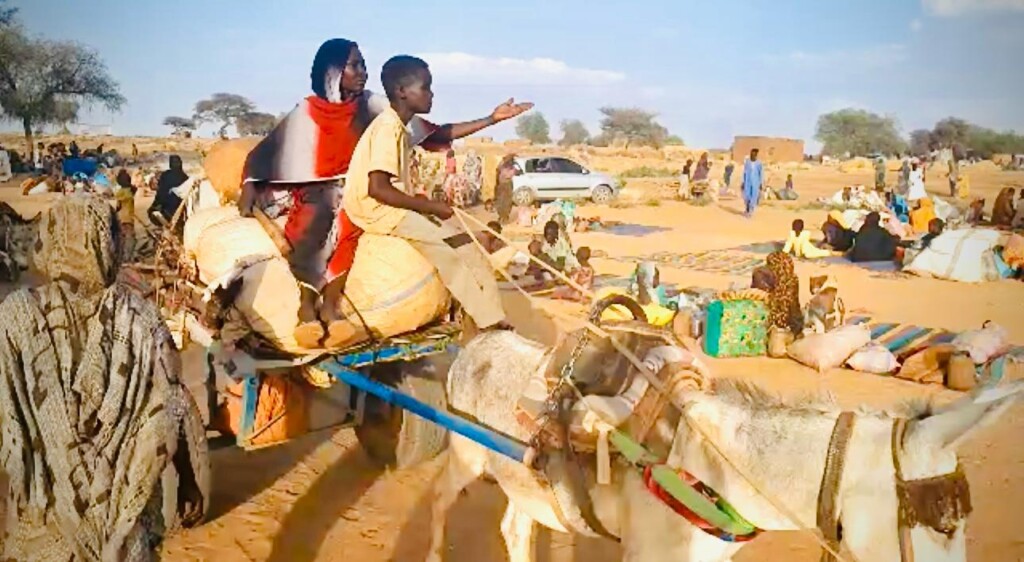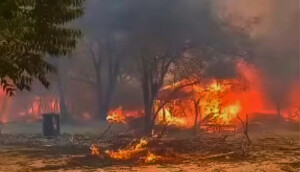Sudan war is stealing the right of women and mothers to life

People displaced from El Fasher in North Darfur moving towards Tawila (Photo: General Coordination of Displaced Persons and Refugees)
Report by Sabah Mohamed Adam of Al-Alaq Centre for Press Services for Sudan Media Forum
The outbreak of war in Sudan has led to the destruction or closure of most public and private hospitals and health facilities that provide medical care to women, forcing many of them, especially pregnant women, to give birth in inappropriate conditions, either at home or inside displacement camps.
High maternal mortality rates
Dr. Sawsan Abdul Qayyum, an obstetrician and gynecologist, said: “Maternal mortality rates and surviving cases of death resulting from bleeding, infection, preeclampsia and other complications have increased, as community midwives and medical staff have been forced to flee conflict zones internally or outside the country, which has exacerbated the crisis and doubled the burden on women and their children.” In safer cities, women faced other challenges: lack of antenatal and postnatal care services as a result of the enormous pressure on the health system, security conditions, lack of transportation and high cost of living made it difficult to access the few health facilities that are still functioning in these conditions, as well as the lack of family planning services and the difficulty of accessing contraceptives.
Intersections of Violations and Health Risks
As for rape survivors, many have not received the necessary treatment due to the difficulty of reaching them and the weak support system, while many are reluctant to disclose what they have experienced, including both male and female victims. Dr. The physical and psychological consequences of these abuses are enormous, and the resulting pregnancy is often denied the option of abortion.
In addition, women and girls in conflict zones face difficulties in accessing sanitary pads, particularly in displacement camps. Pre- and post-menopausal women also lack health care and medications for their conditions.
These realities paint a bleak picture of the reality of women in war zones, where health risks intersect with humanitarian violations, forming a complex crisis that threatens the lives of thousands and has long-term effects on society.
Women on the brink of danger
In the heart of conflict zones, where the sounds of explosions are louder than the moans of the sick, a silent tragedy unfolds for women and girls. Dr. Magda Mohamed said that more than 70% of hospitals have closed their doors, and hospitals specialized in maternity have been turned into empty buildings or rubble. She pointed out that in light of this devastation, thousands of pregnant women find themselves forced to give birth in unsafe conditions, between the walls of dilapidated houses or inside tents, without any equipment to deal with severe bleeding or a faltering birth that may end in death.
Maternal health care is almost non-existent, and access to or post-natal check-ups has become a distant dream, hampered by security risks, lack of transportation and high costs, while the remaining health facilities are collapsing under the pressure of the sheer numbers of patients. The shortage of medical staff has made the scene even bleaker, leaving many women with no hope of obtaining their most basic health rights.
Survivors in a cycle of neglect
In this harsh reality, opportunities for family planning are fading, unwanted pregnancies are increasing, and the risk of death during pregnancy or childbirth is multiplied. As for rape survivors, most of them do not receive treatment and do not find anyone to hear their voices, the stigma of shame and fear silences many women, while the physical and psychological pain remains locked in the chest.
The stories of the women here do not need numbers to prove the tragedy, as every face carries a story of suffering, and every birth under these circumstances is a battle for survival. This crisis is not just a health issue, but a humanitarian catastrophe that requires urgent intervention to save what can be saved, and to protect the right of women and girls to life and dignity .
Sexual violence exacerbates risks
Wafa Adam, an embryologist, says that the already fragile health system in Sudan has completely collapsed, leaving the already scarce sexual and reproductive health services almost non-existent. With widespread sexual violence and lack of access to treatment, Sudan faces a high risk of a public health crisis linked to the spread of HIV/ AIDS and other sexually transmitted diseases.
The health crisis is also exacerbated by pregnancies resulting from ongoing sexual violence, with increasingly narratives of unsafe abortions, exposing women and girls to high rates of illness and mortality in the absence of services. The stigma associated with rape and pregnancy increases the risk to the health of married women, girls and their families by resorting to concealing childbirth for fear of social stigma, which leads to births in extremely dangerous circumstances.
The interruption of access to contraceptives remains an additional challenge, as Sudan has relied heavily on donor funding and private sector services to provide reproductive health services, and with the current situation, these services, which were originally distributed inequitably, have been disrupted, meaning that women and girls within Sudan do not have access to modern contraceptives. Under these circumstances, ensuring access to sexual and reproductive health services is essential to saving the lives of women and girls, their families and their communities. It also highlights the urgent need for a national public health intervention to prevent the AIDS epidemic after the war by benefiting from the lessons and experiences of other countries that have gone through the same conditions similar to the reality of Sudan.
This article by Sabah Mohamed Adam of Al-Alaq Centre for Press Services is published via the platforms of the Sudan Media Forum and its member institutions to highlight the devastating impact of the war on the health of women and mothers in Sudan, where the collapse of the health system has deprived them of basic care for all women and survivors. The lack of obstetric and reproductive care services has also increased maternal mortality rates and health risks. It calls for urgent intervention to protect the right of women and girls to live with dignity.

#SilenceKills #الصمت_يقتل #NoTimeToWasteForSudan #الوضع_في_السودان_لايحتمل_التأجيل #StandWithSudan #SudanMediaForum











 and then
and then